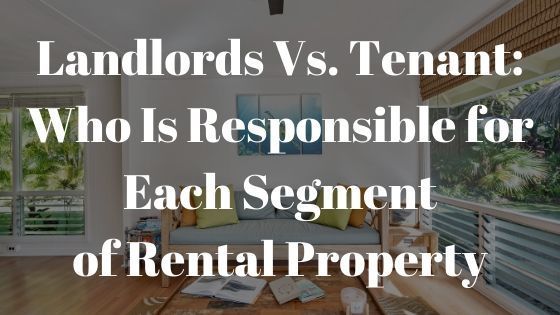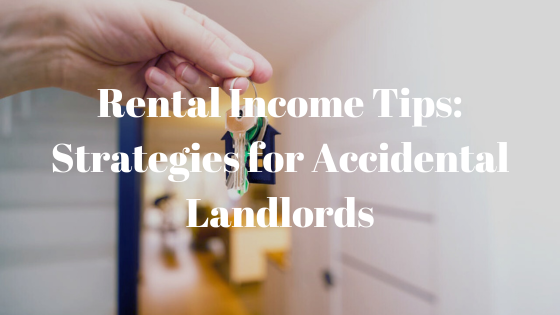Landlords Vs. Tenant: Who Is Responsible for Each Segment of Rental Property
Derek Dawson • June 12, 2020
Rental property is split between two entities: the renter and the landlord. Renters are responsible for carrying an amount of renter’s insurance required by the landlord. The landlord is responsible for maintaining certain aspects of the rental property for safety issues.
Here is a breakdown of each party’s responsibilities:
1. Personal Property
A renter’s personal property must be covered under the renter. Landlords are not responsible for insuring each renter’s personal belongings in the event of a disaster or accident. Renters should have personal belongings coverage on their renter’s insurance policy in order to receive compensation for lost or damaged items.
2. Dwelling Property
The physical rental property, whether it be a home or an apartment complex, must be covered under the landlord’s commercial property insurance. The landlord is responsible for fixing damages and loss to the physical dwelling, such as a tornado sweeping away half of an apartment complex or a storm caving in part of a home’s roof.
3. Property Amenities
Amenities on the rented property, such as pools, gyms, and golf courses, should be covered under the landlord’s insurance policy. The tenant is not responsible for fixing the damage.
If a tenant causes damage to any of the amenities, the landlord’s insurance policy should step in. However, the landlord may then seek compensation from the tenant for the damages. Lawsuits such as this may be covered under the tenant’s liability coverage available in their renter’s insurance policy.
4. Appliances
Appliances should be covered under the tenant’s renter’s insurance policy. A renter's insurance policy will cover most appliances if damaged or lost due to fire, smoke, wind, leaks, theft, and vandalism. Some renter’s insurance policies will also cover electrical appliances that short circuit.
5. Equipment Breakdown
Many large appliances, such as ovens and refrigerators, are provided by the landlord. However, some landlords include a clause in their tenant policy that hands the responsibility of the equipment over to the tenant.
Without this clause, a landlord should pay to have the broken equipment fixed. With this clause, the tenant will have to pay for the equipment to be fixed.
6. Water Damage
Water damage is often excluded on both commercial property and renter’s insurance policies, aside from certain circumstances. Renter’s insurance may cover water damage from appliances such as dishwashers and washing machines.
Natural floods are excluded under both policies. Flood insurance can be added to both a commercial property policy and renter’s insurance policy. Loss or damage to the physical dwelling should be covered by the landlord while loss or damage of any personal belongings should be covered under the tenant’s renter’s insurance policy.
Renter’s insurance Requirements
Renter’s insurance requirements vary depending on location and landlord. Most landlords require a minimum amount of personal general liability and personal belongings coverage. Liability coverage generally starts at $100,000 while personal belongings coverage may start at $30,000.
Renter’s insurance should be purchased through an insurance provider and maintained according to the leasing agreement between the landlord and tenant(s). Repercussions may follow if a renter fails to maintain the proper amount of renter’s insurance, including a written warning and eviction.
Landlords must give renters notice before eviction. Many landlords offer a time period in which the renter can fix the issue to prevent being evicted, but landlords are not required to do so.
For tenants, renter’s insurance comes with three main coverages:
- Liability: Liability covers incidents involving bodily injury or property damage to another party caused by the policyholder.
- Personal Belongings: Personal belongings coverage provides compensation if the policyholder’s items are lost or damaged due to fire, wind, smoke, theft, or vandalism.
- Additional Living Expenses (ALE): Additional living expenses helps with the cost of moving and temporarily living elsewhere while the rented property is being repaired after a disaster.
The landlord is not responsible for providing additional living expenses or offering other housing options in case of a disaster.
Personal belongings coverage may be purchased at a replacement cost value or actual cash value.
Actual cash value covers the cash value of the policyholder’s personal belongings, accounting for depreciation. This means that as the market value of the insured items goes down, so does the amount of compensation the policyholder will receive after filing a claim.
The replacement cost value of items offers compensation to completely replace the item with one of similar or identical value. This type of policy is generally more expensive, but is more likely to allow the policyholder to replace their belongings completely.
Insurance Costs for Renters
The average cost of renter’s insurance is around $15 a month. This depends on the tenant’s location, credit score, coverage limits, deductible, and type of value. Choosing a higher deductible can lower monthly premiums, but it also means paying more once it comes time to file a claim.
This article was written by Augustine Insurance & Financial Services. For more information on this renter’s insurance, you can find their website here.











